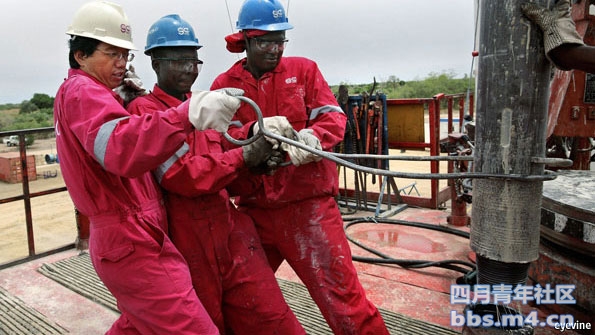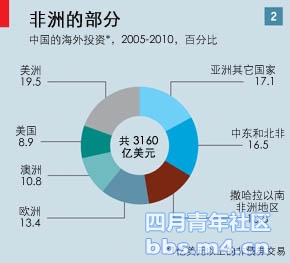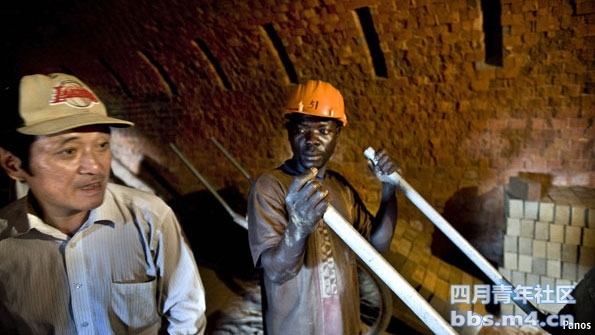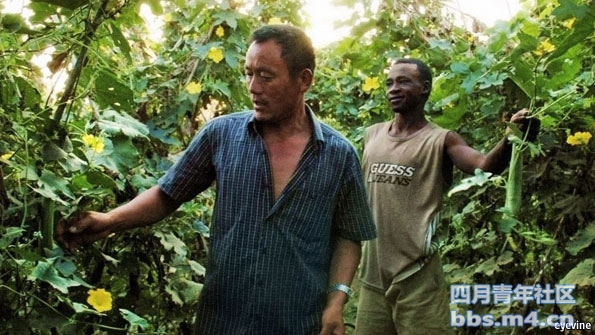【中文标题】中国人在非洲 - 送食还是抢食?
【原文标题】The Chinese in Africa, Trying to pull together, Africans are asking whether China is making their lunch or eating it.
【登载媒体】经济学家
【原文链接】http://www.economist.com/node/18586448

朱良秀在奈洛比的一家酒吧中大口喝着肯尼亚啤酒,他告诉我一句中国格言:“人不能两次踏进同一条河流。”朱先生来自比邻香港的佛山,是个制鞋商,这是他第二次来到非洲。尽管他说他已经逐渐喜欢上这个地方,但你能听出他失望的语气。
三年前,朱先生第一次来到非洲的时候,他的笔记本上记满了订单。他吃惊地发现,非洲人不但愿意与他做生意,还非常喜欢他的公司。他说:“我去过很多国家,从未遇到过如此热烈的欢迎。”陌生人的善待是因为他的祖国与发展中国家密不可分的互助关系。中国是非洲最大的贸易伙伴,非洲大陆超过三分之一的石油销往中国,以此挣来的钱修建了无数的学校和医院。当地人自豪地告诉朱先生,为了帮助非洲摆脱贫穷,中国比其它国家做的事情要多多得多。
这一次他觉得生意做得依然不错,甚至比上次还要好。但是非洲人的态度发生了一些变化,他的合作伙伴说他在剥削他们。中国商品是劣质的代名词,经济中掺杂了政治因素。“殖民”这个词慢慢流传开来。孩子们和他们的父母在悄悄议论街上的流浪狗都被吃掉了。
中国人曾被尊为非洲大部分国家的救世主,而现在对中国的态度却产生了复杂的情绪——尤其是在中国影响举足轻重的小国家里。究其原因,部分在于和商品、服务一同涌入的劣质商业行为。中国人的建筑工程既粗略又草率,大陆公司承建的建筑物有发生过倒塌的现象。安哥拉首都罗安达的一家医院开业的仪式相当隆重,但几个月后墙壁就出现了裂纹,不得不关闭。中国人修建的从赞比亚首都卢萨卡到奇龙杜的公路长130公里,不久就被雨水冲垮。
中国式商业行为
中国在非洲的侨民都来自于一个混乱不堪、无所不用其极的商业文化中,他们没有基本的规则和制度概念。无论在自己国家中还是在国外,他们都不大在乎当地人的感受。一家石油公司——中国石化在加蓬的国家地质公园中进行勘探,另外一家国有石油公司让溢出的原油在苏丹境内形成了几个湖泊。津巴布韦环境部长说,中国跨国公司“像makorokoza矿工一样地运作”,这是一个特指非法淘金者的嘲讽性短语。
当地员工的境遇有时比环境稍好一些。在中国人经营的津巴布韦铜矿中,他们必须要至少工作两年才能戴上安全帽。地下的通风条件极差,死亡事故几乎每天都在发生。为了躲避监察,中国经理贿赂工会的管理者,带他们到中国的按摩院去“考察”。试图抗议的工厂工人代表遭到抢劫,集会工人被暴力驱散。当案件被诉诸法律时,证人遭到了恐吓。
紧张的局势在去年达到了顶峰,赞比亚南部城镇锡纳宗圭的矿工在抗议恶劣的工作条件时,两名中国管理者向人群开枪,造成至少十多名矿工受伤。一些人愈合的伤口下至今还藏有弹丸。当地一名议员Patson Mangunje说:“人们像被激怒的疯狗一样。”
对中国人来说,他们也遇到了失望和愤怒的事情。在南非城市纽卡斯尔,中国人经营的纺织品工厂支付给员工的月薪是200美元,这个数字比中国国内工人的薪资高出很多,但是依然低于当地的最低工资标准。当地工会试图关闭城镇中的工厂,中国厂主不理会工会的决定,或者假装不懂英文。
他们说,很多南非公司支付的工资也没有达到最低标准,这个标准太高了,让企业无法盈利。如果没有中国人,纽卡斯尔的失业率比现在60%的水平还要高。工人们说,低工资至少比没事做要好。最近,一家工会赢得了法院的一项判决,一些工人因此阻止警察关闭他们的工厂。
一位年轻的厂主王金富说:“你看看我们,我们不是奴隶主。”他和他的妻子在4年前从中国南部省份福建来到这里,当时身上只有3000美元。第一年里,他们睡在工厂里肮脏的垫子上,160名员工每周工作40个小时的时候,这对夫妇从清晨到午夜都在包装货物、核对清单、发送商品,整整一年每天都是如此。王先生说:“人们为什么会恨我们呢?”

实际上,中国的确帮助非洲提高了就业率,也让非洲人有能力购买一些基本的商品,比如鞋子和收音机。双方的贸易额在去年超过了1200亿美元(见图1)。在过去两年中,中国给予贫困国家(主要是非洲国家)的贷款数额超过了世界银行。美国智囊团传统基金会估计,从2005年到2010年,中国海外投资的14%都被投往撒哈拉以南的非洲地区(见图2)。大部分资金都经由香港,传统基金会在试图追索资金的具体目的地。

对王先生所提的问题有一个答案,就是竞争,尤其是来自外国人的竞争,在任何国家都不会受欢迎。尼日利亚在近几年有数百家纺织品工厂破产,因为他们无法与廉价的中国服装竞争。整个市场压缩了数千个就业岗位。
喜忧参半
很多来自中国的批评声音说,这是伪装的保护主义,既有的商业组织以牺牲消费者的利益为代价,保持自身的市场优势地位。最近在索韦托和卢萨卡的小巷中出现的中国商人,让当地鸡肉的价格下降了一半,卷心菜的价格下降了65%。当地商人把牲畜装在铁笼子里,拉到竞争委员会门口去抗议。一名小贩Justin Muchindu说:“中国人怎么敢扰乱我们的市场?”在坦桑尼亚的经济中心达累斯萨拉姆,中国人被禁止在市场上出售商品。当地政府在今年早些时候说,欢迎中国人来投资,但是不欢迎他们以“小贩和擦鞋匠”的身份出现。
据中国评论人士介绍,另外一个原因就是中国在输出贸易、投资、就业和技能的同时,也给当地带去了很多坏习惯。即使以非洲人的标准衡量,中国大陆的经济也已经被腐败得千疮百孔。中国经理人在国际行贿排行榜上稳居前列,当这些经理人走出国门,他们给东道主国家带去的是贿赂和对良好秩序的破坏。世界银行已经取消了一些中国大陆公司投标非洲项目的资格。
为中国辩护的人说,中国对当地政府的不利影响是相当有限的。非洲国家的领导人经常发现,他们很难贪污国家的发展资金。钱一般都被放在北京的第三方托管账户中,当一批基础设施建设项目揭标之后,中国公司拿到了合同,钱会直接转移到公司的账户中。不管怎样,非洲得到的是道路和港口,不是钱。至少理论上是这样。
第三个原因是,中国被认为在囤积非洲的资源。中国当然愿意占有更多的石油资源,但目前关注的重点是如何增加全球供应量。中国的国有企业经常在现货市场出售石油和矿产,而且,它对非洲的兴趣不仅限于资源。中国修建的铁路和桥梁很多都远离矿场和油田,就是因为可以赚钱。中国不是单纯是爱心大使,但也不是只想着掠夺土地的殖民者。
中国与非洲间模糊的关系为政客们提供了活跃的土壤。尤其是非洲南部国家的反对派,经常发布反华宣言。卢旺达以南的所有国家都曾经就中国“剥削”的问题发生过激烈的争论。即使在以往波澜不惊的纳米比亚也弥漫着厌恶的情绪,其首都温得和克的中国建筑工地中的工人据说遭到了“不公平对待”。赞比亚的反对派领袖Michael Sata以中国怀疑论者而广为人知。

看好自己的投资。
这些内容中大部分都是不着调的。评论人士说,尽管使用的都是标准的服务合同和谈判条款,但中国的确已经占据了很多自然资源。还有人谴责中国把狱中劳动力送往非洲——当地人曾经看到,穿着相同连体工作服的一群人,行动高度统一,没日没夜地劳动,他们一定是被挟持做这些事的。
即使如此,反抗情绪也是不可避免的。非洲人说他们感到被包围了,来自一个最成功的现代化经济体的成千上万家公司在这片大陆上散开。非洲发展银行的前高级官员Sanou Mbaye说,过去10年里来到非洲的中国人,比过去400年里来到非洲的欧洲人都要多。先来的是国有企业的中国人,后来越来越多的是私人业主和工作完成后拒绝离开的人。
很多人梦想着新生活,矿厂主和建筑商发现了非洲的商机,他们在这里有更大的自由(自己当老板,按自身的意愿行事)。中国政府针对1600家公司的调查现实,越来越多的企业希望把生产基地放在非洲国家。中国投资中,生产业所占的比例(22%)很快就会追上采矿业所占的比例(29%)。
中国在非洲生产企业的扩张,部分原因在于非洲人自己的要求,一些国家把工业投资作为开放资源的前提。三家常驻埃塞俄比亚的中国公司中的两家都是生产型企业。而且,中国人的真实想法其实与此不谋而合。他们在投资海外的时候,不想只做开采资源的事情,他们想在东京竖起摩天大楼;在伦敦经营银行;在好莱坞拍电影。在非洲,他们嗅到了这个地区缺乏竞争的特点。这片大陆即将被中国的自由贸易港口所包围,它是中国走向世界贸易舞台的垫脚石。
北京政府鼓励企业在非洲从事各种商业行为。建筑业最受欢迎,其占据了中国私人在非洲投资总量的四分之三。商务部长说,中国公司每年签署的基础设施建设合同金额超过500亿美元。中国投资50亿美元开发非洲农业,很多非洲人对此表示担忧。
或许中国对非洲最大的推进是在金融领域。中国工商银行收购了南非标准银行20%的股份,这是非洲大陆资产规模最大的银行,它现在已经向中国贸易侨民提供人民币账户服务。其它中国大陆银行也纷纷设立办事处,他们在金碧辉煌的办公室里向中国公司发放免抵押贷款。理论上非洲人也可以进行相同条件的借贷,但是极少发生。
控制这些银行的北京政府对这些批评的声音保持警惕的态度。一位官员承认,破坏中国在非洲形象的不仅仅是肆意胡为的企业家,政府自身的很多行为也要做一些改变。
遭受质疑最多的是中国向非洲国家提供资金援助的使用方式。大部分贷款和资金都被“限制”了,也就是说,收到款项的人必须把这些钱花费在中国公司身上。(日本、西班牙和其它国家也采取了类似的做法,直到最近才有所变化。)但是,附带限制性条件的援助往往只会产生条件恶劣的工作。由于缺少竞争,被赋予特权的公司离开后留下的是粗制滥造的道路和报价虚高的医院。债权人和捐助者通常不会关注这些问题。
更糟糕的是,中国政府从不公开其资金走向,援助金额好像是国家机密。作为最大的贷出方,中国进出口银行和中国发展银行从未公布过向贫困国家发放的贷款金额。刚果民主主义共和国在一次谈判的最后关头接受了国际咨询机构的意见,把一项中国贷款金额从90亿美元缩减为60亿美元。
牢固的友谊
政治要比金融来得下作多了。中国多年来与非洲的暴君们交情莫逆,似乎是相互信赖的好伙伴。表面上,中国以“不干涉内政”为理由支持这些令人厌恶的当权者,而且中国似乎还认为这个理由足够冠冕堂皇。可是非洲人越来越不相信了。
当地方政治强人难以维持局势稳定的时候,中国人在非洲的状况变得越来越棘手。2008年,Robert Mugabe阴谋破坏津巴布韦的选举,引发了民众起义。中国投资者迅速撤离,但反对势力依然认为他们与独裁者有牵连。在苏丹,被国际犯罪法庭通缉的Omar al-Bashir是中国忠实的拥趸,他被控犯有种族灭绝的罪行。但是在1月份的公民投票之后,盛产石油的南方正式退出。北京领导人急忙向原来的敌人示好。
非洲人在与中国人做生意时并非是完全无助的。当然,有些国家的确没有摆出强硬的姿态,比如一贯独断专行的卢旺达就任由中国投资者摆布。但是大部分非洲国家政府都与中国达成了相对合理的交易。比如,安哥拉就是精明的谈判家,其总统公开对中国人说:“你们不是我们的朋友。”安哥拉首都罗安达有很多巴西人和葡萄牙人,安哥拉人经常暗中操纵他们与中国人作对。安哥拉还曾经因为无法就一家石油提炼厂达成一致意见,而驱逐一家中国国有石油公司。一年后,这家公司又恬着脸回来,表示愿意出更多的钱。

中国试图为非洲带路。
然而,更多情况下,是中国人在操纵非洲国家互相斗争。非洲国家驻北京大使馆之间的政策协商活动越来越多,这是改善非洲国家谈判力度的第一步。世界银行和国际货币基金组织是他们可以寻求帮助的人。但是不管非洲政府有多么努力,他们实在无法应对新企业数量的绝对增长。国家保护劳动者和环境的法律是现成的,但是弱小的执法机构无力贯彻这些条文。专门负责监察血汗工厂的卢萨卡劳动督查部门只有一辆公务用车,4个月之前就坏掉了。而中国工程师利用这段时间,可以在平地上建起一片服装厂。
无论在多么遥远的未来,中国与非洲亲密无间的关系似乎是永远不能出现的了。W.H. Auden写道:
我将爱你,亲爱的,我永远爱你,
直到中国和非洲会合,
直到河水从山脉上跳越,
那鱼儿也能跑到大街上生活,
现在,糖醋鱼经常会在撒哈拉以南的街道上出现了。非洲人正在拥抱中国提供的机会,同时又对他们布下的陷阱保持警惕。
西方国家当然也应当关注那些跨越印度洋的中国私企先驱者,比如来自上海、31岁的Danny Lau。一年前,他跟随朋友来到津巴布韦,现在他在那里是一个成功的煤炭贸易商,还涉足房地产。他说,几年后,他们就会到一个更富有的大陆去发展。他们在阿克拉(加纳首都)和布拉扎维(刚果首都)学到的东西将帮助他们向温哥华和萨格勒布前进。
原文:
ZHU LIANGXIU gulps down Kenyan lager in a bar in Nairobi and recites a Chinese aphorism: “One cannot step into the same river twice.” Mr Zhu, a shoemaker from Foshan, near Hong Kong, is on his second trip to Africa. Though he says he has come to love the place, you can hear disappointment in his voice.
On his first trip three years ago Mr Zhu filled a whole notebook with orders and was surprised that Africans not only wanted to trade with him but also enjoyed his company. “I have been to many continents and nowhere was the welcome as warm,” he says. Strangers congratulated him on his homeland’s high-octane engagement with developing countries. China is Africa’s biggest trading partner and buys more than one-third of its oil from the continent. Its money has paid for countless new schools and hospitals. Locals proudly told Mr Zhu that China had done more to end poverty than any other country.
He still finds business is good, perhaps even better than last time. But African attitudes have changed. His partners say he is ripping them off. Chinese goods are held up as examples of shoddy work. Politics has crept into encounters. The word “colonial” is bandied about. Children jeer and their parents whisper about street dogs disappearing into cooking pots.
Once feted as saviours in much of Africa, Chinese have come to be viewed with mixed feelings—especially in smaller countries where China’s weight is felt all the more. To blame, in part, are poor business practices imported alongside goods and services. Chinese construction work can be slapdash and buildings erected by mainland firms have on occasion fallen apart. A hospital in Luanda, the capital of Angola, was opened with great fanfare but cracks appeared in the walls within a few months and it soon closed. The Chinese-built road from Lusaka, Zambia’s capital, to Chirundu, 130km (81 miles) to the south-east, was quickly swept away by rains.
Business, Chinese style
Chinese expatriates in Africa come from a rough-and-tumble, anything-goes business culture that cares little about rules and regulations. Local sensitivities are routinely ignored at home, and so abroad. Sinopec, an oil firm, has explored in a Gabonese national park. Another state oil company has created lakes of spilled crude in Sudan. Zimbabwe’s environment minister said Chinese multinationals were “operating like makorokoza miners”, a scornful term for illegal gold-panners.
Employees at times fare little better than the environment. At Chinese-run mines in Zambia’s copper belt they must work for two years before they get safety helmets. Ventilation below ground is poor and deadly accidents occur almost daily. To avoid censure, Chinese managers bribe union bosses and take them on “study tours” to massage parlours in China. Obstructionist shop stewards are sacked and workers who assemble in groups are violently dispersed. When cases end up in court, witnesses are intimidated.
Tensions came to a head last year when miners in Sinazongwe, a town in southern Zambia, protested against poor conditions. Two Chinese managers fired shotguns at a crowd, injuring at least a dozen. Some still have pellets under healed skin. Patson Mangunje, a local councillor, says, “People are angry like rabid dogs.”
There is anger and disappointment on the Chinese side too. In the South African town of Newcastle, Chinese-run textile factories pay salaries of about $200 per month, much more than they would pay in China but less than the local minimum wage. Unions have tried to shut the factories down. The Chinese owners ignore the unions or pretend to speak no English.
They point out that many South African firms also undercut the minimum wage, which is too high to make production pay. Without the Chinese, unemployment in Newcastle would be even higher than the current 60%. Workers say a poorly paid job is better than none. Some of them recently stopped police closing their factory after a union won an injunction.
“Look at us,” says Wang Jinfu, a young factory-owner. “We are not slave drivers.” He and his wife came four years ago from Fujian province in southern China with just $3,000. They sleep on a dirty mattress on the factory floor. While their 160 employees work 40 hours a week, the couple pack boxes, check inventory and dispatch orders from first light until midnight every day of the year. “Why do people hate us for that?” says Mr Wang.
Indeed, China has boosted employment in Africa and made basic goods like shoes and radios more affordable. Trade surpassed $120 billion last year (see chart 1). In the past two years China has given more loans to poor countries, mainly in Africa, than the World Bank. The Heritage Foundation, an American think-tank, estimates that in 2005-10 about 14% of China’s investment abroad found its way to sub-Saharan Africa (see chart 2). Most goes in the first place to Hong Kong. The Heritage Foundation has tried to trace its final destination.
One answer to Mr Wang’s question is that competition, especially from foreigners, is rarely popular. Hundreds of textile factories across Nigeria collapsed in recent years because they could not compete with cheap Chinese garments. Many thousands of jobs were lost.
Mixed blessings
Quite a bit of criticism of China is disguised protectionism. Established businesses try to maintain privileged positions—at the expense of consumers. The recent arrival of Chinese traders in the grimy alleys of Soweto market in Lusaka halved the cost of chicken. Cabbage prices dropped by 65%. Local traders soon marched their wire-mesh cages filled with livestock to the local competition commission to complain. “How dare the Chinese disturb our market,” says Justin Muchindu, a seller. In Dar es Salaam, the commercial capital of Tanzania, Chinese are banned from selling in markets. The government earlier this year said Chinese were welcome as investors but not as “vendors or shoe-shiners”.
Another answer, according to China’s critics, is that the Chinese are bringing bad habits as well as trade, investment, jobs and skills. The mainland economy is riddled with corruption, even by African standards. International rankings of bribe-payers list Chinese managers near the top. When these managers go abroad they carry on bribing and undermine good governance in host countries. The World Bank has banned some mainland companies from bidding for tenders in Africa.
China’s defenders reply that its detrimental impact on governance is limited. African leaders find it surprisingly hard to embezzle development funds. Usually money is put into escrow accounts in Beijing; then a list of infrastructure projects is drawn up, Chinese companies are given contracts to build them and funds are transferred to company accounts. Africa, for better and worse, gets roads and ports but no cash. At least that is the theory.
A third answer is that China is seen as hoarding African resources. China clearly would like to lock up sources of fuel, but for the moment its main concern is increasing global supply. Its state-owned companies often sell oil and ore on spot markets. Furthermore, its interest in Africa is not limited to resources. It is building railways and bridges far from mines and oilfields, because it pays. China is not a conventional aid donor, but nor is it a colonialist interested only in looting the land.
The ambiguities in China’s relationship with Africa have created fertile ground for politicians. Opposition parties, especially in southern Africa, frequently campaign on anti-China platforms. Every country south of Rwanda has had acrimonious debates about Chinese “exploitation”. Even in normally calm places like Namibia, antipathy is stirring. Workers on Chinese building sites in Windhoek, the capital, are said to get a “raw deal”. In Zambia the opposition leader, Michael Sata, has made Sino-scepticism his trademark.
Keeping an eye on the investment
Much of this is wide of the mark. Critics claim that China has acquired ownership of natural resources, although service contracts and other concessions are the norm. China is also often accused of bringing prison labour to Africa—locals assume the highly disciplined Chinese workers in identical boiler suits they see toiling day and night must be doing so under duress.
Even so, the backlash is perhaps unsurprising. Africans say they feel under siege. Tens of thousands of entrepreneurs from one of the most successful modern economies have fanned out across the continent. Sanou Mbaye, a former senior official at the African Development Bank, says more Chinese have come to Africa in the past ten years than Europeans in the past 400. First came Chinese from state-owned companies, but more and more arrive solo or stay behind after finishing contract work.
Many dream of a new life. Miners and builders see business opportunities in Africa, and greater freedom (to be their own bosses and speak their minds, but also to pollute). A Chinese government survey of 1,600 companies shows the growing use of Africa as an industrial base. Manufacturing’s share of total Chinese investment (22%) is catching up fast with mining (29%).
In part this spread is happening because Africans have asked for it. Some countries made industrial investments a precondition for resource deals. In Ethiopia two out of three resident Chinese firms are manufacturers. Yet the Chinese did not need much pushing. They have always wanted to do more than dig up fuel when investing abroad. They hope to build skyscrapers in Tokyo, run banks in London and make films in Hollywood. In Africa they can learn the ropes in a region where competition is weak. The continent—soon to be ringed with Chinese free-trade ports—is a stepping stone to a commercial presence around the globe.
To this end, the government in Beijing is encouraging all sorts of activity in Africa. Construction is a favourite, accounting for three-quarters of recent private Chinese investment in Africa. The commerce ministry says Chinese companies are signing infrastructure deals worth more than $50 billion a year. For investment in African farming, China has earmarked $5 billion. A lot of Africans view this anxiously.
Perhaps the most significant Chinese push has been in finance. Industrial and Commercial Bank of China has bought 20% of Standard Bank, a South African lender and the continent’s biggest bank by assets, and now offers renminbi accounts to expatriate traders. Other mainland banks have opened offices too, and from their sleek towers they make collateral-free loans to Chinese companies. In theory Africans are eligible to borrow on the same terms, but this rarely happens.
The government in Beijing, which controls the banks, is alert to such criticism. China’s image in Africa is sullied by more than just cowboy entrepreneurs, admits an official. Many of the government’s own practices could be improved.
Suspect above all is the type of transfer that China offers to African countries. Most loans and payments are “tied”—ie, the recipient must spend the money with Chinese companies. (Japan, Spain and others followed a similar model until fairly recently.) But tied aid leads to shoddy work. With no competition, favoured firms get away with delivering bad roads and overpriced hospitals. Creditors and donors often set the wrong priorities.
Worse, the Chinese government is anything but transparent about its money. Aid figures are treated as state secrets. China Exim Bank and China Development Bank, the main lenders, publish no figures about their vast loans to poor countries. The Democratic Republic of Congo was persuaded at the last minute by international advisers to scale back a Chinese lending facility from $9 billion to $6 billion.
Firm friends
Politics can be even murkier than finance. For years China has been chummy with African despots who seem to be reliable partners. Publicly, China presents its support for odious incumbents as “non-interference” and tries to make a virtue of it. Africans are less and less convinced.
Relations get especially tricky for the Chinese when strongmen fail to maintain stability. In Zimbabwe in 2008 Robert Mugabe’s sabotage of elections set off civil upheaval. Chinese investors fled, yet the ascendant opposition still linked them to the dictator. In Sudan Omar al-Bashir, who is wanted by the International Criminal Court on genocide charges, has long been a Chinese stalwart. But following a referendum in January, the oil-rich south of his country has seceded. Rulers in Beijing are belatedly trying to befriend his enemies.
Africans are not helpless in their business relations with the Chinese. Some, admittedly, have not been strong in their dealings: a usually bossy Rwanda lets Chinese investors run riot. But African governments by and large get reasonable deals; and some, like Angola, are masterful negotiators. Its president publicly told his Chinese counterpart, “You are not our only friend.” Brazilians and Portuguese are numerous in Luanda, the capital, and Angolans frequently play them off against the Chinese. Angola once banished a Chinese state oil company after a disagreement over a refinery. The company came crawling back a year later, offering more money.
China tries to lead the way in Africa
Increasingly, however, it is the Chinese who play Africans off against each other. Growing policy co-ordination between African embassies in Beijing is a useful first step in improving African bargaining power. The World Bank and the IMF are valuable advisers. But no matter how hard African governments try, they cannot cope with the sheer volume of new enterprises. Rules exist to protect employees and the environment, but institutions are too weak to enforce them. Labour inspectors in Lusaka, who monitor sweatshops, have use of only one car and recently it was broken for four months. In the meantime Chinese engineers built an entire cluster of garment factories from scratch.
For aeons the prospect of China and Africa coming closer together had seemed otherworldly. W.H. Auden wrote:
I’ll love you, dear, I’ll love you
Till China and Africa meet,
And the river jumps over the mountain
And the salmon sing in the street.
Sweet-and-sour salmon now regularly croon in sub-Saharan streets. Africans are embracing new opportunities made in China yet remain wary of all the pitfalls.
Western countries too will want to observe the progress of Chinese privateers who cross the Indian Ocean: men like Danny Lau, a 31-year-old from Shanghai, who a year ago followed a group of friends to Zambia, where he is now a successful coal trader and dabbles in property. In a few years, he says, they will move on to a richer continent. What they learn in Accra and Brazzaville will travel with them to Vancouver and Zagreb. |